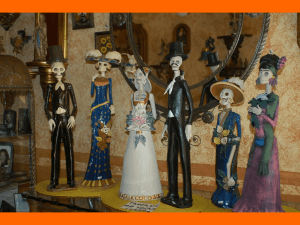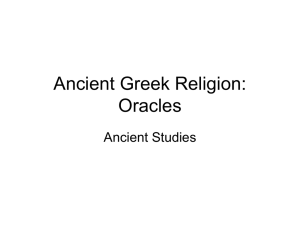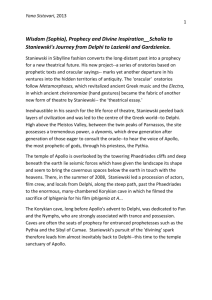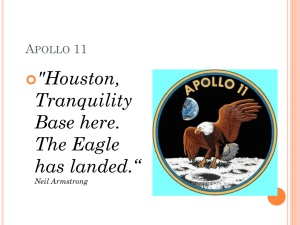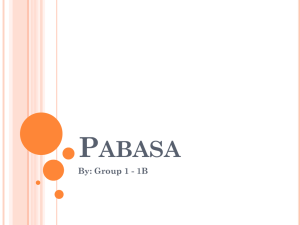Dancing towards Delphi: Ritual and Identity in the Homeric Hymn to
advertisement
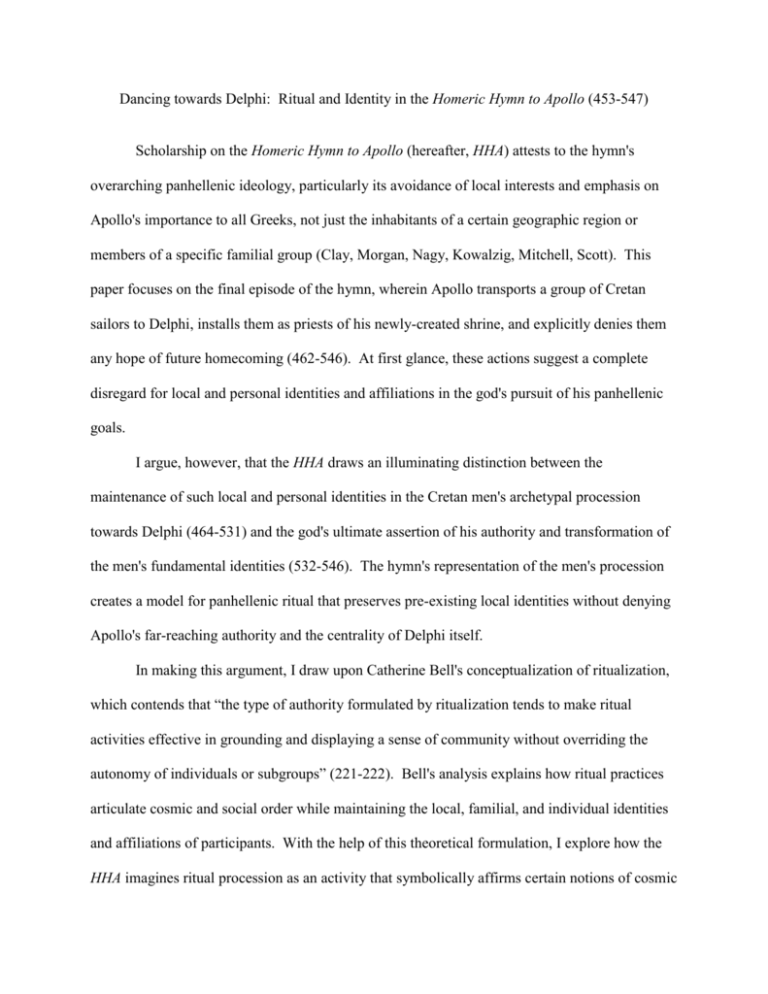
Dancing towards Delphi: Ritual and Identity in the Homeric Hymn to Apollo (453-547) Scholarship on the Homeric Hymn to Apollo (hereafter, HHA) attests to the hymn's overarching panhellenic ideology, particularly its avoidance of local interests and emphasis on Apollo's importance to all Greeks, not just the inhabitants of a certain geographic region or members of a specific familial group (Clay, Morgan, Nagy, Kowalzig, Mitchell, Scott). This paper focuses on the final episode of the hymn, wherein Apollo transports a group of Cretan sailors to Delphi, installs them as priests of his newly-created shrine, and explicitly denies them any hope of future homecoming (462-546). At first glance, these actions suggest a complete disregard for local and personal identities and affiliations in the god's pursuit of his panhellenic goals. I argue, however, that the HHA draws an illuminating distinction between the maintenance of such local and personal identities in the Cretan men's archetypal procession towards Delphi (464-531) and the god's ultimate assertion of his authority and transformation of the men's fundamental identities (532-546). The hymn's representation of the men's procession creates a model for panhellenic ritual that preserves pre-existing local identities without denying Apollo's far-reaching authority and the centrality of Delphi itself. In making this argument, I draw upon Catherine Bell's conceptualization of ritualization, which contends that “the type of authority formulated by ritualization tends to make ritual activities effective in grounding and displaying a sense of community without overriding the autonomy of individuals or subgroups” (221-222). Bell's analysis explains how ritual practices articulate cosmic and social order while maintaining the local, familial, and individual identities and affiliations of participants. With the help of this theoretical formulation, I explore how the HHA imagines ritual procession as an activity that symbolically affirms certain notions of cosmic and social order (in this case, notions with a distinct panhellenic orientation) while still preserving “the autonomy of individuals [and] subgroups” (Bell 222). For example, the language of the HHA endows both the men and the god with distinct kinds of leadership and authority. The leader of the Cretans is referred to as such both before and after the procession to Delphi (Κρητῶν ἀγός, HHA 463, 525), a phrase that defines his position relative to his men and their local identity. Yet while the noun agos marks the man, Apollo is characterized by forms of the verb agō (δεῦρ’ ἤγαγεν, 473, ἤγαγες, 526). He also initiates the ritual itself, while the men follow his lead (“and the lord Apollo, the son of Zeus, began for them, having in his hands a lovely lyre, strumming finely and stepping high. And the Cretans followed, stamping their feet,” ἦρχε δ’ ἄρα σφιν ἄναξ Διὸς υἱὸς Ἀπόλλων / φόρμιγγ’ ἐν χείρεσσιν ἔχων ἐρατὸν κιθαρίζων / καλὰκαὶ ὕψι βιβάς· οἱ δὲ ῥήσσοντες ἕποντο / Κρῆτες, 514517). Apollo's leadership is primarily spatial: in the form of a dolphin, he leads the men to Krisa, as a god, he leads them in a musical procession to the sanctuary itself. The Cretan leader, on the other hand, retains a kind of political leadership defined by his relationship to his group and their local affiliations (Κρητῶν ἀγός). In the HHA, the processional act itself reinforces Apollo's divine leadership and points to the centrality of Delphi. At the same time, the hymn preserves the Cretan men's local identities and political structures. The overarching panhellenic ideology of the narrative is only realized after the procession has concluded, when Apollo definitively transforms the Cretan sailors into Delphic priests via a combination of divine promise and threat. The HHA thus draws a key distinction between the effects of ritual practice and more immediate applications of divine authority. Works Cited Bell, C. 1992. Ritual Theory, Ritual Practice. Oxford. Clay, J. S. 1989. The Politics of Olympus: Form and Meaning in the Major Homeric Hymns. Princeton, NJ. Kowalzig, B. 2007. Singing for the Gods: Performance of Myth and Ritual in Archaic and Classical Greece. Oxford. Mitchell, L. 2007. Pan-Hellenism and the Barbarian in Archaic and Classical Greece. Swansea. Morgan, C. 1990. Athletes and Oracles: The Transformation of Olympia and Delphi in the Eighth Century BCE. Cambridge. Nagy, G. 1990. Greek Mythology and Poetics. Ithaca. Scott, M. 2010. Delphi and Olympia: The Spatial Politics of Panhellenism in the Archaic and Classical Periods. Cambridge.
